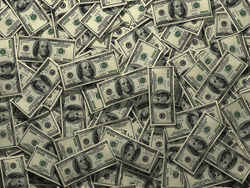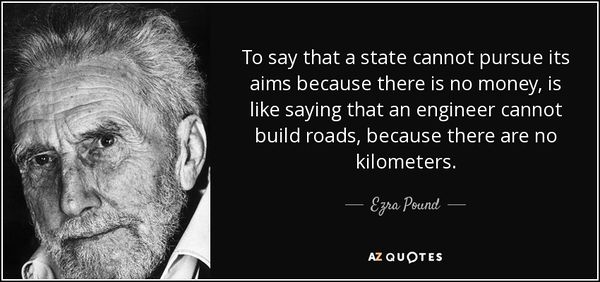Money
(technology) | |
|---|---|
 | |
| Interest of | • Susan Athey • Bill Browder • Hillary Clinton • David Graeber • Ivo Mosley • Craig Sawyer • Tracy Twyman • Paul Volcker |
| Subpage(s) | •Money/Counterfeiting •Money/Creation •Money/Fractional-reserve banking |
| Money is an agreement within a community to use something standardized as medium of exchange | |
Money is an agreement within a community to use something standardized as medium of exchange (Lietaer). [1]
Contents
Origins
Money has evolved in many different fashions in different places throughout history. So-caleed "precious" metals such as gold and silver have been used in many places, in part because of its visual appeal, scarcity and relative unreactivity.
Money paper bank notes were derived from gold ownership certificates in the Middle Ages.
Criticism
The modern system of fractional reserve banking is widely criticised as being tool of the rich used to extract tribute from the poor. Recommended alternatives include nationally issued money, as was the case before the creation of central banks such as the Bank of England.

Banning high denomination banknotes
In 2016, India and Venezuela banned their highest denomination banknote. Australia was also reported to be considering the same move.[3]
Money laundering
- Full article: Money laundering
- Full article: Money laundering
Money laundering is the process of obscuring the origin of money, e.g. if it arises from theft or drug trafficking.
Examples
| Page name | Description |
|---|---|
| Bitcoin | A cryptocurrency |
| Bond | A type of security under which the issuer (debtor) owes the holder (creditor) a debt, and is obliged to repay over a specified amount of time. |
| CBDC | Blockchain hosted replacement for cash, run by central banks |
| Cash | |
| Cryptocurrency | Digital currencies with computer generated security protection. |
| The Future of Money | A basic explanation of how different types of complementary currencies work and why the current monetary system is insufficient and/or outdated |
Related Quotations
| Page | Quote | Author | Date |
|---|---|---|---|
| John Perry Barlow | “The economy of the future is based on relationships rather than possessions.” | John Perry Barlow | |
| Blockchain/Consensus | “Similar to PoS, this trend of the largest being best-placed to receive the most rewards means that the network will trend towards an oligarchy inclined to collude, rather than compete. The largest actors will become richer and strengthen their position as delegates over time. As they earn more rewards, they will hold more tokens. As they hold more tokens, they will have a proportionally higher share of the vote. This means they will then be more likely to be elected, and the cycle repeats, consolidating supply in hands of a narrower and narrower minority.” | ||
| George Carlin | “Now, to balance the scale, I'd like to talk about some things that bring us together, things that point out our similarities instead of our differences. 'Cause that's all you ever hear about in this country. It's our differences. That's all the media and the politicians are ever talking about—the things that separate us, things that make us different from one another. That's the way the ruling class operates in any society. They try to divide the rest of the people. They keep the lower and the middle classes fighting with each other so that they, the rich, can run off with all the fucking money! Fairly simple thing. Happens to work. You know? Anything different—that's what they're gonna talk about—race, religion, ethnic and national background, jobs, income, education, social status, sexuality, anything they can do to keep us fighting with each other, so that they can keep going to the bank! You know how I define the economic and social classes in this country? The upper class keeps all of the money, pays none of the taxes. The middle class pays all of the taxes, does all of the work. The poor are there just to scare the shit out of the middle class. Keep 'em showing up at those jobs.” | George Carlin | |
| Corporate media/Logic | “Now, to balance the scale, I'd like to talk about some things that bring us together, things that point out our similarities instead of our differences. 'Cause that's all you ever hear about in this country. It's our differences. That's all the media and the politicians are ever talking about—the things that separate us, things that make us different from one another. That's the way the ruling class operates in any society. They try to divide the rest of the people. They keep the lower and the middle classes fighting with each other so that they, the rich, can run off with all the fucking money! Fairly simple thing. Happens to work. You know? Anything different—that's what they're gonna talk about—race, religion, ethnic and national background, jobs, income, education, social status, sexuality, anything they can do to keep us fighting with each other, so that they can keep going to the bank! You know how I define the economic and social classes in this country? The upper class keeps all of the money, pays none of the taxes. The middle class pays all of the taxes, does all of the work. The poor are there just to scare the shit out of the middle class. Keep 'em showing up at those jobs.” | George Carlin | |
| Document:The Occult Technology of Power | “We are undone, my dear sir, if legislation is still permitted which makes our money, much or little, real or imaginary, as the moneyed interests shall choose to make it.” | Thomas Jefferson | |
| Money/Creation | “Generally speaking the zero sum game promotes conflict. Conflicting parties need money to stand competition (in the extreme case: fight a war) in order to maintain their positive balance position. The only regulatory principle to limit the promotion of violence in all shapes and colors is the monetary monopoly's need to manage risk. Fatally, the risk taken by banks is distorted by the doctrine that the monetary monopoly as a whole may not fail. This so called Moral Hazard caused by public bailouts encourages investments in exploitation and war. What really trickles down is violence, not wealth.” | 'Smithy' | |
| J. P. Morgan | “... [credit] is an evidence of banking, but it [credit] is not the money itself. Money is gold, and nothing else.” | J.P. Morgan & Co. J. P. Morgan | |
| Subsistence | “The great enemy of enterprising capital is a self-sustaining life.<a href="#cite_note-1">[1]</a> A family living a self-contained existence on a piece of land is profitable to no one.<a href="#cite_note-2">[2]</a> Once the family is displaced, the land can be put to profit. Dispossessed adults can be ‘gainfully employed’ (whose gain?) and the whole family can be trained up—via advertising and the rest—as consumers. Lastly, in the peculiar perversity of modern economics, the illnesses, depressions, crimes and other discontents of the dependent are of immense profit to the pharmaceutical, insurance, care, security, manufacturing, entertainment and prison industries.” | Ivo Mosley | 2013 |
Related Documents
| Title | Type | Publication date | Author(s) | Description |
|---|---|---|---|---|
| Declaration of Currency Independence | declaration | May 2021 | John McAfee | The main author, John McAfee, died mysteriously in jail the next month. |
| Declaration of Monetary Independence | declaration | 2021 | Mark Maraia Mike Hobart | |
| Document:Modern Monetary Theory: an explanation | blog post | 18 April 2023 | Richard Murphy | The MMT approach to the command of resources is the polar opposite of that in neoliberalism. MMT seeks to do what is possible. Neoliberalism seeks to constrain what is possible. |
| The Future of Money | Book | Bernard Lietaer | A basic explanation of how different types of complementary currencies work and why the current monetary system is insufficient and/or outdated |
References
- ↑ Keynote and Conversation with Bernard Lietaer, https://vimeo.com/35085719
- ↑ Rethinking money - How new currencies turn scarcity into prosperity
- ↑ http://www.nzherald.co.nz/business/news/article.cfm?c_id=3&objectid=11766817